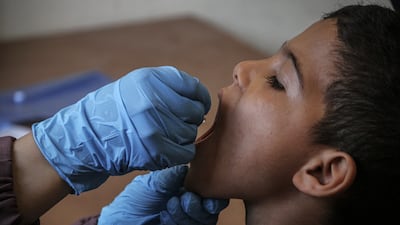Live updates: Follow the latest news on Israel-Gaza
A polio vaccination campaign in central Gaza has exceeded targets set by UN agencies as the initiative entered its third day on Tuesday, with the World Health Organisation saying more than 160,000 children under 10 had been reached.
The UN-led drive aims to inoculate 640,000 children across Gaza after the polio virus was detected in sewage samples in Gaza. After the initial vaccination phase, the agencies have agreed another series of pauses will take place to deliver the second dose of polio vaccine.
An 11-month-old boy whose left leg was paralysed last month was the first confirmed case since polio was declared eradicated in the occupied Palestinian territories 25 years ago.
Vaccinations are being carried out during daily eight-hour pauses in fighting between Israel and Hamas in specific areas of the Palestinian enclave. High rates of displacement after nearly 11 months make it difficult to determine how many children in the area need to receive the vaccine, the UN said.
"Thousands" of families and children turned out on the first day of the campaign, Louise Wateridge, senior communications officer at the UN agency for Palestinian refugees (UNRWA), told The National from central Gaza. On the second day, mobile units were sent to reach people who did not visit the vaccination centres. On day three, most of the campaign was being carried out "tent to tent" and "shelter to shelter", Ms Wateridge said.
A fourth day is being allocated as a "rest and catch-up day", she said. Medical teams are to travel to find any children who have not yet received vaccine doses.
Overall, the children were excited, Ms Wateridge said. "They kept putting up their pinkies so we can mark them and show off their ink stains," she added, referring to the means medical staff use to show who has received a vaccine dose.
Nine out of 10 Gazans have been forcibly displaced since the war began on October 7. Israel issued 16 eviction orders for civilians across the enclave in August. More than 40,800 people, mostly civilians, have been killed and at least 94,291 injured, according to Gaza's health authorities.
On Tuesday, families reported security fears and misinformation, primarily spread online, about the safety of the vaccine. "One father told us he heard that the 'cold chain' had been broken," Ms Wateridge said. "We reassured him and showed him the side of the container that the vaccine comes in with a cold chain seal on the side that would change colour if the vaccine's temperature changed."
Even without the threat of death by bombardment, a walk to a vaccination centre is risky. Ms Wateridge said the entrance to one UN health station, formerly a wedding hall, was blocked by raw sewage.
"It's a moat of sewage and it's ironic that people have to wade through it to receive a polio vaccine," she said, referring to traces of the virus first detected in waste.
With Gaza now approaching its 12th month of war, Ms Wateridge said vaccinating their children was not every parent's main concern. "One mother asked us why she should vaccinate her child as bombs continue to fall," she added. "This is a valid point and a challenge of vaccinating in a war zone when people are focused more on survival."
On Thursday, teams will move to the south and then the north for the third and final phase of the initial round of the campaign. The process will begin again in four weeks when a second dose is administered to children.


